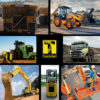Winter is Coming. Is Your Equipment Ready?

The harvest season will soon come to a close, and before you know it, temperatures will drop and snow may start to fall. Some states experience frost as early as October, so properly winterizing your equipment to prepare for the cold will ensure fewer maintenance and operating issues come spring.
Preparing Machines for Winter Use
Farmers are outside year round, using equipment throughout the winter months for livestock care, snow removal and even digging into frozen ground. The importance of proper equipment care and maintenance in cold, snowy weather is amplified due to wintry conditions.
Especially in newer, technology-driven machines, electronics are at a greater risk for damage in the cold. Sub-freezing temperatures not only slow response time, but battery-powered electronics will also lose their charge faster. Both the engine and electronics can be damaged beyond repair if they freeze over the winter and then thaw in the spring.
The chance of damage to the engine and other components can be greatly reduced by letting the machine warm up and following these additional tips prior to equipment use:
- Before the cold arrives, replace the lubricant in each compartment with one featuring the highest oil viscosity allowed based on your region’s typical ambient temperature. More information on lubricant viscosities can be found here.
- Store starting fluids at indoor room temperature, and only inject starting fluid while the engine is cranking.
- Use coolant designed for use in the lowest expected outside temperature. To avoid damage, allow the engine to cool before adding antifreeze.
- If the engine isn’t warm enough for startup, obstruct the radiator with a piece of cardboard to block cold air. This will increase engine temperature and heat hydraulic fluid more quickly.
- After startup, let the engine run until it reaches operating temperature to help prevent the intake and exhaust valves from sticking.
- The battery should be kept fully charged and warm. In subzero temperatures, it may help to bring the battery inside to store it at room temperature when not in use.
- To avoid fires, scorched wiring or a melted battery case, never use a torch or other open flame to heat components.
Tips for a Proper Winter Maintenance Routine
It’s important to wash down equipment after every use to remove salt and dirt. Park your machine on wooden planks to prevent it from freezing to the ground. Salt is especially damaging, as it can corrode and rust the frame and other metal parts. Take these additional steps to keep your machine up and running for the duration of the winter season:
- Top off fuel after every use to prevent freezing.
- Check the air intake daily for snow and ice, and remove all dirt from the tread so it does not freeze into the tires.
- Use dry nitrogen gas to inflate flat tires to eliminate ice crystals, which can hold the valve stem open in the tire. You can find this at your local dealer.
- All rubber parts, including hoses, tires, drive belts and electrical wiring should be inspected weekly for cracks and other damage.
Proper care and maintenance before the cold hits will improve performance and reduce repair costs down the road. To learn more about suggested tips for cold weather operating and storage, read our safety guidelines.
A general outline for proper machine use is only the start of cold weather preparation. Conditions, applications and resources vary greatly across the country. For more information specific to your machine and climate, consult your local Cat® dealer or visit us online.
We’d like to hear about your approach to equipment use in cold weather.
- What tasks do you use agriculture equipment for during the winter?
- Has your equipment ever been damaged during winter months? What caused the damage and how have you prevented it from happening again?
- What maintenance tasks do you add to your winter routine?
- How long do you typically let the engine run on a freezing cold morning?
- What preventative measures do you take to protect your battery?
- What other practices have you found helpful to optimize machine performance in the cold?
source: http://forums.cat.com/t5/BLOG-On-The-Level/Winter-is-Coming-Is-Your-Equipment-Ready/ba-p/71492












